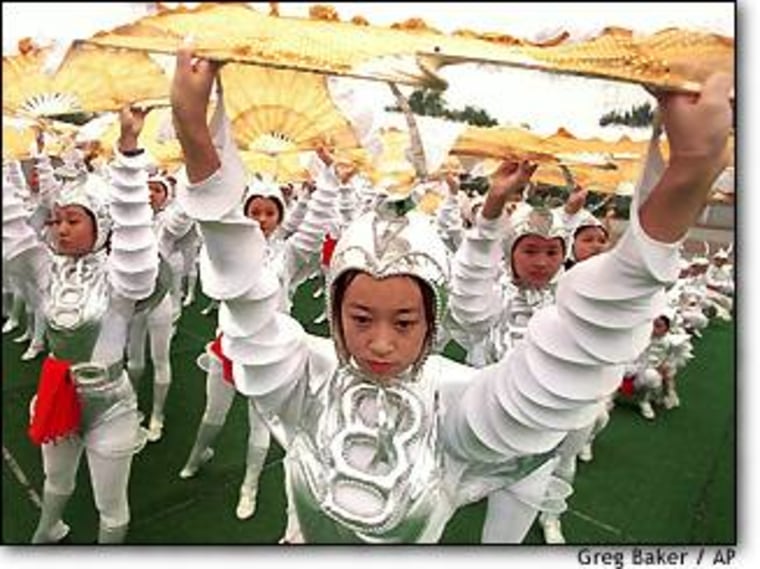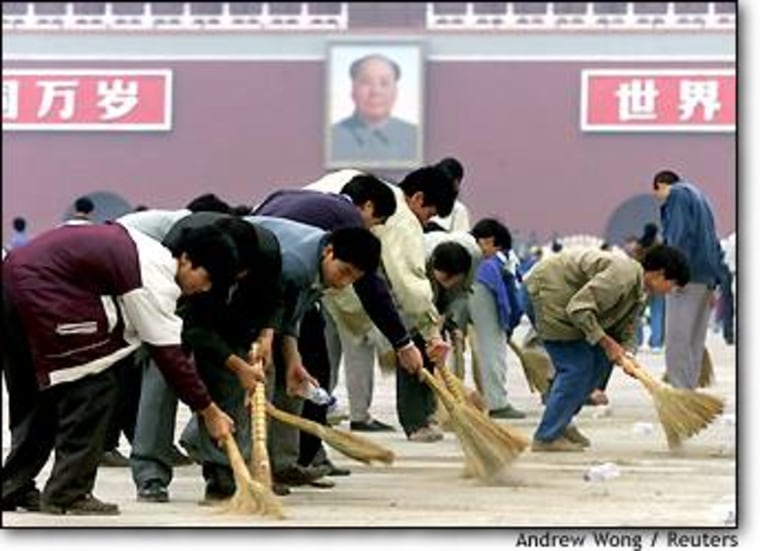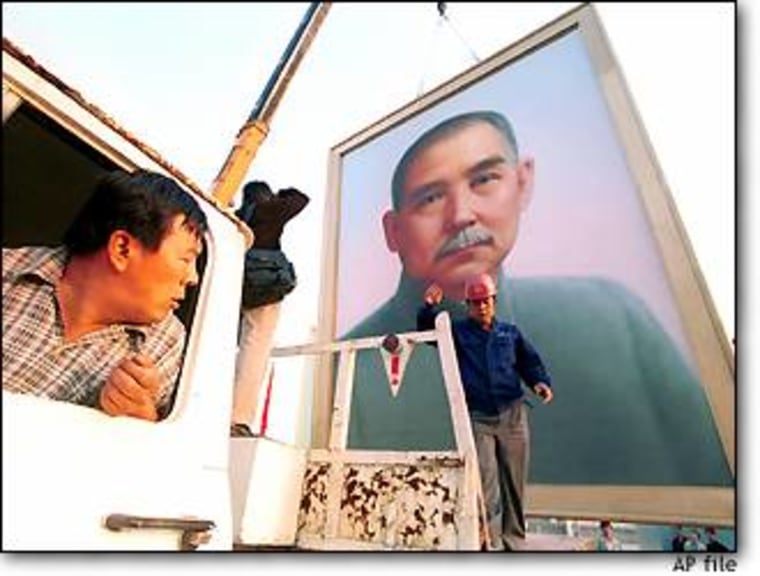This is a city in overdrive. Bulldozers and construction cranes rumble at all hours and traffic patterns are in chaos from road work and detours. From the Boulevard of Eternal Peace to Tiananmen Square, China’s capital is being buffed to a fine sheen for the celebration of the 50th anniversary of the Chinese communist victory. But beneath the gloss, the country’s long-term challenges are apparent.
The city's police force force is working overtime, cracking down on thousands of massage parlors and karaoke bars deemed to offer “erotic and other illegal services.”
The $1 billion Oriental Plaza construction complex, the biggest and most spectacular real estate project in the city center, has been ordered to ready its huge fountain in time for the massive Oct. 1 parade even if the building itself is still unfinished.
Advertising billboards on the main road leading to Tiananmen Square that brag of the arrival of capitalism in Mao’s fatherland have been torn down, some $40 million in advertising contracts notwithstanding.
Officials claim that 28,000 unsightly and “illegal” building structures have already been demolished, some of them the last remaining vestiges of the 19th century city.
Great sweep forward
The clean-up drive has also taken on the trappings of old-style Communist social crusades. A 100-day “strike-hard campaign” against crime has been launched, punctuated by the execution of 61 people one day in the southwest city of Chongqing.
In Beijing, “waidi ren” or migrants, most of them rural peasants seeking opportunity in the capital, are liable to be banished if they can’t show proper papers. Officials said some 100,000 of them have already been “persuaded to move out of the city.”
Foreigners are no exception. More than a week ago, some foreigners in the north and northeast parts of Beijing were the target of early morning police raids. Some climbed fences to escape detention. They were in violation of laws requiring all foreigners to reside only in designated housing.
Special zeal has been reserved for the spiritual world. The main target is the now-banned sect Falun Gong — “Wheel of Law” — a spiritual movement that combines the ancient techniques of meditation and breathing exercises with Buddhist and Taoist precepts.
Falun Gong, started in 1992, claims a total membership of 70 million, against the 60 million membership of the ruling Chinese Communist Party. (China insists there are no more than two million Falun Gong followers in China).
China’s prime time television news program and the state’s entire propaganda machine have been harnessed for unrelenting attacks on the “crimes and evils” of Falun Gong, now seen as the biggest threat to the moral and ideological supremacy of the Communist Party, eclipsing even the pro-democracy opposition groups.
The biggest “crime” of Falun Gong was the “Incident of April 25th,” when some 10,000 followers encircled the Chinese leadership compound in central Beijing with demands for official recognition — the most daring action since the Tiananmen student movement of 1989. A warrant has been issued for the Falun Gong founder, who now resides in New York; his key aides are all in detention and will soon face criminal prosecution.
Thin-skinned celebrants
The sweeping clean-up campaign betrays the anxieties of China’s leaders as they plan a massive official gathering in Tiananmen Square to celebrate the golden anniversary of the People’s Republic. A total of 1.5 million people will take part in the planned celebrations, which will include the first military parade in 15 years. How to guarantee a “trouble-free” celebration on such a massive scale is a particular concern at a time of a looming crisis.

The anniversary finds many Chinese in no mood to celebrate. The initial gains of the economic reform launched by Deng Xiaoping two decades ago are proving hard to sustain as the reform process deepens and enters a more difficult stage — getting the state out of big industry.
The revamping of China’s bloated state-owned industry is throwing millions of workers out of work. They join an army of surplus laborers and migrants from the rural areas to form a potent source of social unrest.
The economy is slowing down. Exports, foreign investments, and domestic spending, the foundation of past growth, are slowing. To stimulate domestic demand, China’s leaders have resorted to Keynesian techniques — deficit spending, repeated interest rate cuts and massive public works. The government even talked up the stock market, hoping to duplicate the “wealth effect” in the United States.
Still, the Chinese consumer refuses to spend, saving up instead for harder times. The result is deflation, continuous price declines in the past 22 months.
Corruption has also affected the national mood. A recent government audit showed that officials have stolen or wasted more than $14 billion in the first half of 1999, nearly a fifth of central government revenue.
Blowing off steam
The current difficulties clearly threaten to divert people’s attention away from the crowning achievements that will be the main theme of the 50th anniversary celebration.

According to Wang Ning, head of the Celebration Parade Department, some 500,000 will join the Tiananmen celebrations in the morning of Oct. 1. Another 1 million people will be mobilized to participate in a grand evening party at Tiananmen Square, complete with fireworks and laser shows.
The morning parade will include some 1,500 fashion models, retired revolutionaries, teachers, the handicapped, representatives of the five official religions and the heads of private enterprises.
It will also feature a military parade displaying China’s latest missiles, tanks, artillery and other weaponry — the kind of muscle flexing that had not happened since the end of the Cold War.
Rehearsals have become regular sources of upheaval in the capital for months now. A preview of the military parade in August took people by surprise when tanks and missile-carrying trucks rumbled through Tiananmen Square after dark.
The eight-hour rehearsal prompted complaints from traffic-trapped pedestrians but drew crowds of curious Beijing citizens who hadn’t tanks there since the army opened fire on student demonstrators in 1989. That anniversary, in June, passed with somewhat less fanfare.
Eric Baculinao is an NBC News producer based in Beijing.
